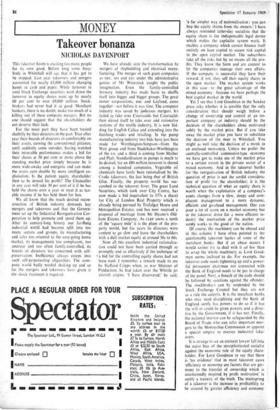Takeover bonanza MONEY
NICHOLAS DAVENPORT
This takeover boom is exciting too many people for its own good. Before long some busy- body in Whitehall will say that it has got to be stopped. Last year takeovers and mergers accounted for nearly £3,000 million changing hands in cash and paper. While turnover in total Stock Exchange securities went down the turnover in equity shares went up by nearly 60 per cent to over £9,000 million. Stock- brokers had never had it so good. Merchant bankers, there is no doubt, make too much of a killing out of these company mergers. But no one should suggest that the shareholders do not deserve their luck.
For the most part they have been treated shabbily by their directors in the past. Year after year their boards of directors sit comfortably on their assets, earning the conventional pittance, until suddenly some outsider, having watched their miserable performance, makes a bid for their shares at 50 per cent or more above the standing market price simply because he is more wide-awake and energetic and can make the assets earn double by more intelligent ex- ploitation. Is the patient equity shareholder then to be denied his profit? The Chancellor in any case will take 30 per cent of it if he has held the shares over a year or treat it as tax- able income if he has held them for less.
We all know that the much desired recon- struction of British industry demands key mergers and takeovers and that the Govern-- • ment set up the Industrial Reorganisation Cor- poration to help promote and speed them up. After its century-long history our far-flung industrial world had become split into too many sectors and groups, its manufacturing and sales too oriented to the easy-going home market, its managements too complacent, too amateur and too often family-controlled, its boards of directors too concerned with self- preservation. Inefficiency always creeps into such self-perpetuating oligarchies. The com- pany world badly needed shaking up and so far the mergers and takeovers have given it the shock treatment it required. We have already seen the transformation by mergers of shipbuilding and electrical manu- facturing. The merger of such giant companies as GEC. AEI and EEC under the administrative genius of Mr Weinstock caught the public imagination. Even the family-controlled brewery industry has made haste to shuffle itself into bigger and bigger groups. The great motor corporations, amc and Leyland, came together—not before it was time. The computer industry was saved by judicious mergers. Ici failed to take over Courtaulds but Courtaulds then stirred itself to take over and rationalise sections of the textile industry. It is now bid- ding for English Calico and extending into the finishing -trades and retailing. In the pump manufacturing industry two bids have just been made for Worthington-Simpson—from the Weir group and from Studebaker-Worthington of the us. and a third is coming from Mather and Platt. Standardisation in pumps is much to be desired, for an £80 million turnover is shared among a hundred companies. Vegetable oil chemicals have lately been rationalised by the Croda takeovers, the last being that of British Glue. Finally, the property world has suc- cumbed to the takeover fever. The great Land Securities, which took over City Centre, has now made a bid (equivalent to I77s a share) for City of London Real Property which is already being pursued by Trafalgar House and Metropolitan Estates, and has now received a proposal of marriage from Mr Hyams's Old- ham Estates Company. As cuuP owns a tenth of the 'square mile' it is the plum of the pro- perty world, but for years its directors were content to go slow and leave the shareholders with a dull market equity at around 50s to 60s.
Now all this excellent industrial rationalisa- tion could not have been carried through so promptly and so effectively if the technique of • a bid for the controlling equity shares had not been used. I remember a remark made to me by Stafford Cripps when, as war Minister of Production, he had taken over the Whittle jet aircraft engine. f have discovered,' he said, 'a far simpler way of nationalisation: you just bur the equity shares from the owners.' F have always reminded latter-day socialists that the equity share is the indispensable legal device which makes the capitalist system work. It enables a company which cannot finance itself entirely on loan capital to secure risk capital in the open capital market. The subscribers take all the risks but by no means all the pro- fits They They know the form and are content to let the companies manage their own affairs. If the company is successful they have their • reward; if not, they sell their equity shares in the open market. The market system works in this case—to the great advantage of the mixed economy—because we have perhaps the best-capital market in the world.
Yet I see that Lord Goodman in the Sunday press asks whether it is sensible that the only consideration that should weigh before a change of ownership and control of an im- portant company or industry should be the decision of the shareholders alone motivated-, solely by the market price. But if you take away the market price you have to substitute the decision of the man in Whitehall. You might as well take the decision of a monk in an enclosed monastery. Unless we prefer the centrally-controlled communist-type economy - we have got to make use of the market price to a certain extent in the private sector of a mixed economy. And in the takeover battles for the reorganisation of British industry the question of price is not the sordid considera- tion of profit for the shareholder; it is the technical question of what an equity share is worth when the exploitation of a company's • assets changes from a slow, sleepy and com- placent management to a more dynamic, efficient and go-ahead management. One can pour a lot of scorn on a market economy but in the takeover drive for a more efficient in- dustry the mechanism of the market price surdly works to the good of the nation.
Of course, the machinery can be abused -and in this column I have often pointed to the questionable takeover tactics of some of the merchant banks. But if an abuse -occurs I would Sooner try to deal with it ad hoc than to scrap the whole machinery as Lord Good- man seems inclined to do. For example, the takeover code needs tightening up and a power- ful permanent chairman not connected with the Bank of England needs to be put in charge of the panel. Next, a breach of the code should be followed by sanctions against the offender. The stockbrokers can be suspended by the Stock Exchange Council but they are not as a rule the culprits. It is the merchant banks who may need disciplining and the Bank of England surely has powers to do so if it has the will or could be given powers, and a direc- tive by the Government, if it has not. Finally, the national interest can be safeguarded by the Board of Trade who can refer important mer- gers to the Monopolies Commission or appoint a special umpire to oversee industrial take- overs.
It is strange to see an eminent lawyer fall into the naive bias of the unsophisticated socialist against the economic role of the equity share- holder. For Lord Goodman to say that there is no evidence' that in most takeover cases 'efficiency or economy are factors that are ger- mane to the transfer of ownership which is unashamedly inspired by profit motivation' is surely a travesty of the truth. The mainspring of a takeover is the increase in profitability to be secured by greater efficiency and economy in a company's management. I have often criti- cised the cult of the equity shares when it has gone too far and have proposed in these columns the creation of a company Ombuds- man who should represent the general interest at company meetings and, indeed, at takeovers. Should not Lord Goodman, as chairman especially of British Lion, be thinking along these constructivist lines rather than pursue the destructivist propaganda of the anti-mixed economy fanatic?



































 Previous page
Previous page